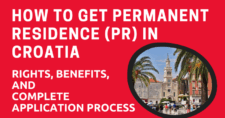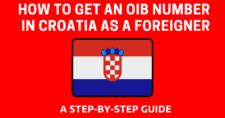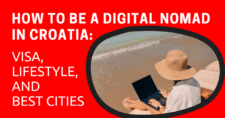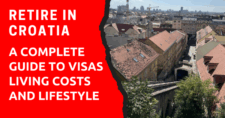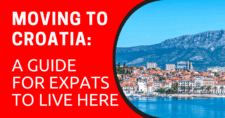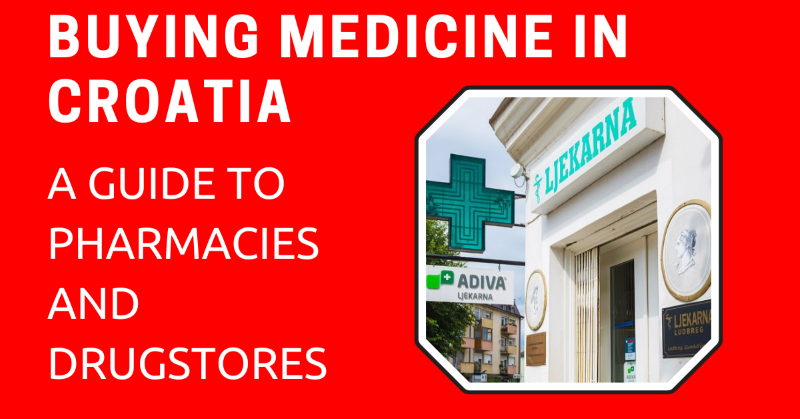
This article will take approximately 12 minutes to read. Don't have the time right now? No worries. Email the ad-free version of the article to yourself and read it later!
An easy guide on buying medicine in Croatia, including information on Ljekarna pharmacies, prescription drugs, over-the-counter medication, and communication tips with pharmacists.
It’s often said that when traveling or moving to a new country, what we worry about more than getting lost or food is “getting sick,” right? Personally, I think that’s true. When I first moved to Croatia, I had bed bugs and was allergic to cleaning products, so I had to find medicine to apply myself. Luckily, the pharmacy system here is easy to navigate and not complicated, yet upholding high European standards.
In this article, we have compiled our experiences and methods for purchasing medicine in Croatia for you to learn about—from what pharmacies are available, which medications require prescriptions (and how to obtain them), to little tips to make your life easier when moving here. Ready? Let’s dive in!
Disclaimer: This article may include links to products or services offered by ExpatDen's partners, which give us commissions when you click on them. Although this may influence how they appear in the text, we only recommend solutions that we would use in your situation. Read more in our Advertising Disclosure.
Contents
Key Takeaways
- Pharmacies are labeled as Ljekarna, the only brand authorized to sell prescription drugs, which are available across the city. Retailers (drugstores like DM, Müller) can only sell vitamins/supplements.
- Antibiotics, birth control pills, blood pressure medication, and drugs for chronic diseases require an electronic prescription (e-recept) from a doctor registered in Croatia only.
- For tourists, the quickest way is to go to private clinics (Private Clinics) or use emergency units (Hitna Pomoć) to request a prescription.
- You should carry a medical summary and know the generic name of the medication in English so that the pharmacist can easily help find the correct medicine.
Where to Buy Medications in Croatia
When looking for a pharmacy here, it’s really easy. Just look for the large green sign reading Ljekarna or the familiar green cross symbol. These places are official pharmacies authorized to sell prescription medications. If you’re just looking to buy general over-the-counter meds or beauty products, there are regular retail stores to shop at as well. Let’s see how these two differ!
Ljekarna (Official Pharmacy)
This is the only place in Croatia authorized to sell prescription drugs legally. They also have general medications, supplements, and vitamins all in one shop. Prices are so affordable that there’s viral content saying, “If you come to Croatia, no need to bring cosmetics or medications because the prices here are much better.”
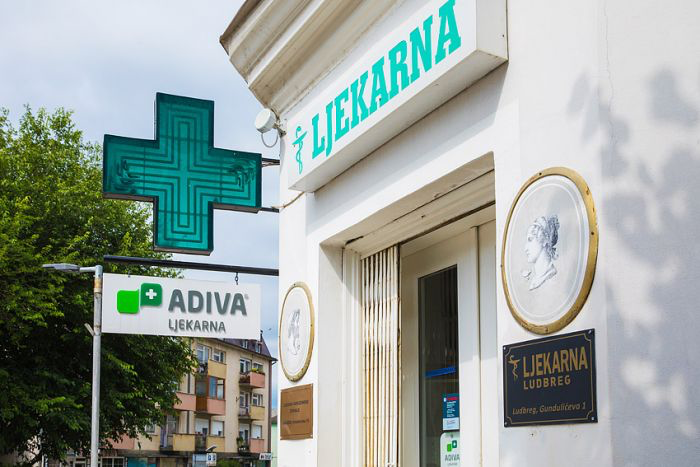
What you can be sure of is that every place will always have a professional pharmacist ready to give basic health advice. They’re also very easy to find because they’re spread out across all major cities, in communities, villages, and tourist spots. Don’t worry about the time either, as some stores in big cities are open 24 hours.
But drugstores here aren’t convenience stores. They only have medicine, medical supplies, and health products. You can’t just walk in and grab things yourself, whether it’s vitamins or creams. You’ll always need to get advice from the pharmacist first.
Tips: Pharmacists in Croatia might not speak much English, so prepare a picture or use a translation app to write down your symptoms in advance to avoid communication problems.
Drugstores (General Retail Stores)
For general retail stores, known as Drugstores in Croatia, they’re similar to popular drugstores at home like Watsons or Boots. Popular stores here include Bipa, DM (Drogerie Markt), and Müller, which focus mainly on beauty, health, and household products.
These stores stock common household medicines like paracetamol, basic pain relievers, and band-aids, but you’ll find a wider selection of supplements, vitamins, and cosmetics compared to pharmacies. However, they don’t carry prescription meds or specialist pharmacists. If it’s more serious than just a minor headache or if you need something more complex, you definitely need to head straight to a Ljekarna.
How to Buy Medicine in Croatia for Tourists
I’ve never personally bought prescription medicine, but it seems straightforward: just hand the prescription to the pharmacist. For minor aches, just explain where it hurts. Even if pharmacists aren’t always fluent in English, you can use a translator tool or show a picture. They’ll usually suggest the cheapest option first, but if you’ve had allergies or need alternatives, let them know. In Croatia, buying medicine falls into two main categories:
Prescription Medicine
These types of medications require a prescription from a Croatian registered doctor or a hospital physician. Examples include all antibiotics, antidepressants, contraceptives, and medications for chronic diseases like blood pressure or diabetes medications.
Buying them is very easy. You don’t need to print or carry any paper because when you visit a hospital or clinic, the doctor will issue an electronic prescription (e-recept) linked with your health insurance number. If you’re a tourist, you can use your ID. Then, just go to any Ljekarna and tell them you’re there to pick up a prescription. The pharmacist will check your records and dispense the medication to you. Examples of medications that require a prescription include:
- All antibiotics
- Antidepressants and psychiatric medications
- Oral contraceptives
- Most chronic disease medications, such as blood pressure and diabetes medications
- Strong analgesics
- Anticoagulants/Blood Thinners
- Thyroid medications
- Immunosuppressants
- Gout flare treatments
- Certain eye drops
How to Get a Prescription from a Doctor
Electronic prescriptions (e-recept) must be issued by authorized doctors in Croatia only. For tourists or those without HZZO health insurance, the primary and most convenient channel is to visit hospitals and Emergency Clinics (Hitna Pomoć – Emergency Services)
For sudden illnesses or minor accidents, you can go directly to the emergency room of a state hospital. The doctor will examine and issue the necessary emergency prescription. Or you can visit private clinics or general practitioners. This is the quickest and most convenient option for obtaining non-urgent prescriptions, especially for ongoing medications (e.g., birth control, chronic disease meds). Private doctors also tend to speak English more fluently.
Over-the-Counter Medications
These are meds that pharmacists can dispense directly, as they carry low risk. Examples of over-the-counter medications include:
- General painkillers, basic medications
- Cold remedies, allergy medications, and antacids
- Anti-diarrheal medications (such as Loperamide or Probiotics)
- Mild laxatives for treating constipation
- Digestive aids
- Mild burn creams and aloe vera gel
- Creams/medications for treating external fungal infections
- Anti-itch creams for insect bites
- Saline solution for nasal irrigation
- Eye drops for dry eyes
- Nasal spray for reducing swelling (should be used sparingly)
- Vitamins, minerals, and herbal supplements (available in general drugstores)
- Products for joint care and mild sleep aids (like melatonin)
Common Over-the-Counter Medicines in Croatia
If you’re not dealing with anything serious, getting meds in Croatia is easier than you’d think! Whether you walk into an Ljekarna (pharmacy) or pop by retail shops like DM or Müller, you’ll find well-stocked shelves with all the basics. It’s a traveler’s paradise for those who pack light but stay prepared. Here’s what you can easily find:
- Pain relievers and fever reducers like paracetamol, aspirin, and ibuprofen, which also act as anti-inflammatories, are readily available without a prescription.
- For those with digestive issues like heartburn, bloating, or constipation, there are plenty of antacids and laxatives (like Bisacodyl) to choose from.
- Vitamin supplements: B complex and vitamin C are top favorites among Croatians and are readily available, often used to boost immunity and reduce fatigue.
- Cough and cold medicines are easy to find, such as expectorants (Bromhexine, Acetylcysteine) and decongestants that help clear up breathing.
- For those who are sensitive or frequently experience motion sickness, there are allergy and motion sickness medicines available in both tablet and liquid forms, which can be purchased at general pharmacies.
- Herbal remedies are another type of medicine easily obtainable because Croatians still prefer herbal products, both as medicine and supplements, such as Silymarin for liver health, Sabal palm for prostate health, Ginkgo biloba for brain health, and Valerian for sleep aid.
How to Buy Medicine Online in Croatia
For those who don’t want to go out shopping or need to stock up on vitamins and beautiful cosmetics, Croatian law allows you to order health products and over-the-counter (OTC) medicines online easily. But to emphasize once again, ‘prescription medicines are strictly prohibited from online sales!’
You can order from official websites of well-known networks like Ljekarna, such as Ljekarna.hr or DM and Müller There are plenty of shopping options! The method is the same as general online shopping: select the product you want, add it to the cart, make the payment, and then sit back and wait for the product to arrive.
Price and Cost of Medicine in Croatia
As many people say, “Medicines in Croatia are priced better than in other European countries,” this isn’t an exaggeration because prices are strictly controlled by the National Health Insurance Fund (HZZO – Hrvatski zavod za zdravstveno osiguranje), which keeps medicine prices stable and often cheaper than in many European countries. If you already have health or travel insurance that covers medication costs, you hardly have to pay anything.
Overall, the cost of prescription medicines in Croatia is noticeably cheaper than in the United States. According to a report by the RAND Corporation (2021), which compared global drug prices, medicines in the U.S. are about 2-3 times more expensive than in OECD countries (including Croatia). While medicine prices in Croatia are similar to those in Eastern Europe, they may be slightly higher compared to some Western European Union countries.
For example, the approximate prices of basic medicines are as follows:
- Blood pressure medication (Prescription): €5.00 – €15.00
- Antibiotics (Prescription): €10.00 – €25.00
- Cholesterol-lowering drugs (Statin – Prescription): €8.00 – €20.00
- Pain relievers/Antipyretics (OTC): €5.00 – €6.00
- Dietary supplement vitamins (OTC/Supplement): €3.50 – €7.00
Health Tips for Tourists and Digital Nomads
Important information for tourists or digital nomads. You should know that if you don’t have health insurance in Croatia, you’ll need to buy private insurance or pay for all medications yourself. Most prescriptions must be issued by a doctor registered in the Croatian system, especially for chronic illnesses or acute infections.
If you’re traveling to Croatia and have regular medications you need to take, it’s a good idea to carry a medical summary in English, clearly listing the generic drug name and dosage. You can show this to a pharmacist or doctor in an emergency. Remember the generic name because the medication might come in different brands.
Knowing the generic name will help Croatian pharmacists find an equivalent medication quickly.
My Experience Buying Medicine in Croatia
When I first moved to Croatia, my experience was anything but ordinary. I encountered bed bugs from the get-go and even had an allergic reaction to the cleaning products. Even though I brought some medicine from Thailand, it just wasn’t enough.
What I did was take a picture of the symptoms and ask the pharmacist for advice. But there was a problem because the people at the store mainly spoke Croatian, and their English wasn’t very strong. So I resorted to showing them a direct image of bed bugs from Google, just to make it clear what was biting me. It worked better than expected.
The pharmacist understood immediately and provided the right medicines, even when explaining about the cleaning solution allergy. Turns out, showing a photo really saved the day, just a little trick that can help a lot when communicating with pharmacists in Croatia.
For those with common symptoms like headaches or stomachaches, don’t worry too much. Medicines like paracetamol are known worldwide. Just say the generic name directly.
But if the symptoms aren’t clear, like having a stomachache without knowing the cause and wanting to consult a pharmacist, be prepared to spend some time explaining. Not everyone speaks fluent English, so it’s best to prepare some basic translated sentences in Croatian in advance. At least you won’t have to nervously pull up Google Translate in front of the pharmacy, and it will help them understand you much faster.


